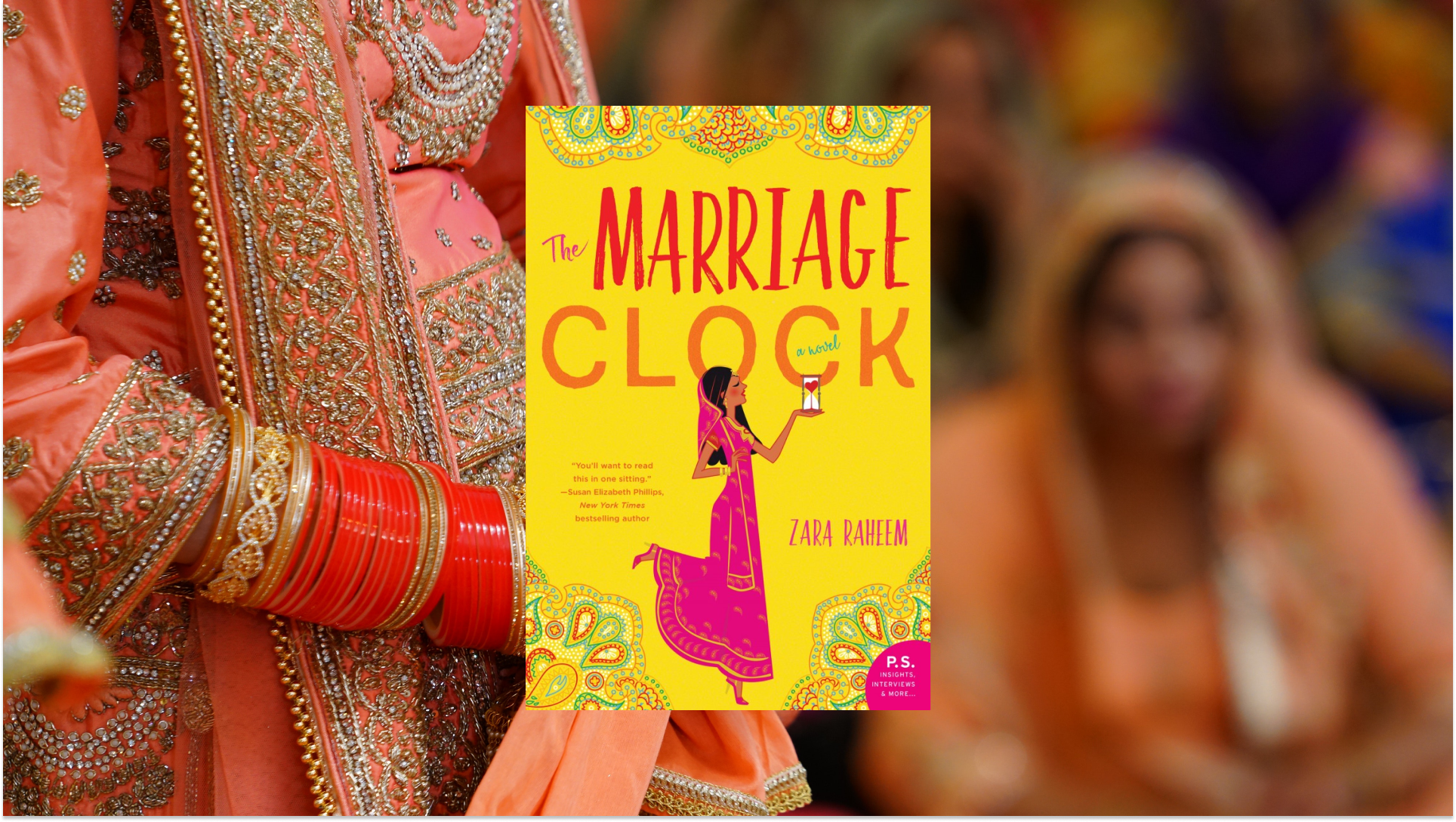The Marriage Clock by Zara Raheem

Every South Asian girl is aware of a clock that starts ticking the day she turns 20, where every passing year brings with it burgeoning social pressure to get married - complete with anxious parents, inquisitive relatives, and judgmental Rishta aunties of the conventional arranged marriage scene. But what happens when you’ve grown up on a diet of Bollywood pop culture that pedestalizes fantastical notions of love and romance, versus a traditional marriage and matchmaking culture that preaches settling down in a life-long commitment with a man before anything else? Zara Raheem’s debut novel ‘The Marriage Clock’ is a refreshingly light and witty exploration of this desi dichotomy led by a young Indian-American female protagonist Leila Abid, who yearns to experience the kind of over-the-top romance she’s seen on the Bollywood silver screen with the perfect man of her dreams, before her more conservative parents step in and help her find a Dulha the old-fashioned way who fits their own very different idea of ‘Mr. Perfect’. The book weaves together a litany of experiences and emotions into a first-person story narrative, allowing one to sympathize with the predicaments of a young millennial out in the quest for love in a world that only believes in marriage.
Having promised to find them a Damad within three months, Leila sets out in a race against time searching for a man that both her parents can approve of, while who also happens to be the real-life embodiment of all the handsome, adventurous, and romantic Bollywood heroes she’s loved her entire life. Some of the most amusing descriptions of botched dates and the many arranged meetups with potential grooms are enough to make the reader chuckle – with disappointed Leila rejecting men that don’t measure up to the gold standard that her Bollywood overindulgence has set. So much as a guy using incorrect grammar, wearing flip-flops, having visible nose hair, or even simply speaking a certain way is enough to trigger her ‘Sudden Repulsion Syndrome. However, Leila Abid’s determination to not let go of her search for the man she believes she deserves, despite mounting pressure from parents and peers is an unapologetic proclamation that she will not just settle for any man that believes he’s good enough for her, and that simply being partnered up in marriage is not the only thing defines a woman’s worth.
The storyline is also tailored to reflect some of the toxicities of the whole Desi Rishta process. The Leila Abid we see from start to end is almost a coming-of-age story of self-realization and rebuilt self-esteem after the often soul-crushing experience of being ridiculed by society for being a single woman, and being judged by strangers for everything from your career and ambitions to weight and skin complexion – a nightmare most girls are well-aware of in our traditional arranged marriage culture. What often remains at the end of being dragged through these humiliations is a hollow shell of the woman that was before. The shaming done to still-single women, the stigma attached to divorced women, the denigration of women that don’t live up to traditional beauty standards – being tossed around, judged, and rejected by strangers over ‘Chai Trolley’ scenes leaves it every time upon the girl herself to pick up her broken pieces and start again.
In Leila Abid, Zara Raheem has crafted a highly relatable protagonist for many young Muslim women who have been influenced by both their conservative South Asian heritage, as well as more liberal Western values that empower individual women in their decision-making. Her character development throughout the novel shows a balance between her Western upbringing and her South Asian background. This is evident from the kind of man she wants despite the abundance of blonde, blue-eyes Goras to choose from - a cultured South Asian Muslim infused with modern non-traditional values. I believe this one choice steers the storyline away from the cliché of many other romance-comedies based on desis in the West, but this is also exactly what makes Leila’s search even harder. The discrepancy in what courtship and marriage entail for young women versus their older generation parents is shown parallel to this contrast of cultures, with often very different views on love, tradition, and gender roles in society.
Leila Abid’s character development through emotions, frustration, disappointment, and heartbreak is perhaps best summarized as one of breaking free of teenage romance fantasies and maturing into a more self-accepting and self-assured young woman. However, I would have also liked some closure to Leila’s often selfish and narcissistic quirks and attitudes we see through some of the first parts of the book. What I realized as I read on is that while Leila seems very perturbed by society’s unfair standards of beauty for women, there’s no dearth of descriptions of her dates’ physical flaws as partly the reason for shutting them down. Neither is there a lack of requirements for physical beauty on her laundry list of expectations for her perfect man written down on her ‘7 napkins’; where the man she wants is the quintessential amalgam of about half a dozen Bollywood heroes (because apparently, not even handsome Bollywood hunks are all-in-one packages).
There’s also an instance where Leila is dumbfounded at her date’s hint at splitting the bill at the restaurant, despite previously having explicitly stated how she desires a ‘non-traditional’ husband. So what happened to challenging traditional gender roles and stereotypes? Or does ‘non-traditional’ only mean a man that doesn’t expect you to cook and clean?
Nonetheless, The Marriage Clock is one of the more unique and entertaining novels I remember reading in recent times. Even though the book is mostly fiction, the emotional rollercoaster that our dating and match-making culture has become is all too real for many young women in the marriage market. This is what makes The Marriage Clock so relevant to the context of our contemporary society.
The book isn’t unnecessarily verbose and the writing style allows for a very quick read (less than 2 days in my case), making it a strong recommendation from me for anyone looking for a light summer read. The purpose of my reviews is to lure people into reading the whole book themselves without giving too much of it away, and I believe it’s an impressive debut novel if you’re looking to explore young and emerging writers. I’d rate this an 8/10 given how enjoyable of a read this was, and it’s gotten me already stoked for what Zara Raheem comes up with next!
Share
About Me

Join our newsletter
Get business tips once a month
Legal Stuff
